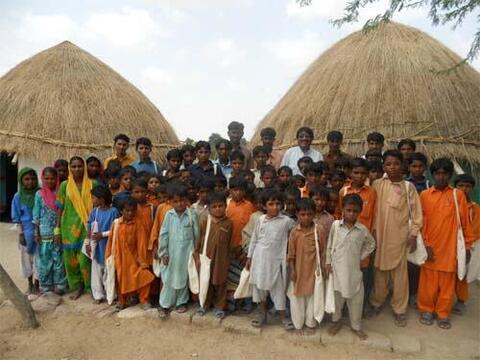The Parkari Community Development Programme (PCDP) came into being to relieve the desperate plight of the Parkari Community of Pakistan, mainly resident in lower Sindh, but throughout the whole province too. Originally, the Parkari community came from the beautiful land of Nagar Parkar, which is a hilly desert area. This traditional desert homeland of the Parkaris often experiences frequent droughts. At these times, Parkaris migrate to other areas to survive. They live below the poverty line and lack having even basic amenities, as well as no access to education, health services and clean drinking water. They are often unaware of their basic human and political rights. Very few are literate or have vocational skills. Many of them owe huge debts to landlords or money lenders. Parkaris are therefore a vulnerable and marginalized group of society. Consequently, PCDP was established to bring the Parkari community out of this vulnerability and illiteracy. We are thankful to Almighty God Lord, who gives us energy and zeal to be able to persevere in meeting our commitments and responsibilities.
Introduction
PCDP focuses on the Parkari community, which numbers up to 1.2 million, scattered throughout lower Sindh. 99% are peasant farmers, either owning land in the Thar Desert area where drought is frequent, or living as landless farm labourers in the irrigated area where they are at the mercy of powerful landowners. . The community’s social status is that of a scheduled caste within the caste system originating in India. Much of the Parkari community is still unaware of civil & political rights, and do not have enough knowledge to fight to protect their rights because of the high illiteracy rate. Presently, only 5% of Parkaris are aware of their basic rights and only 5% are literate. This is because of illiteracy, poverty, religious discrimination, and pressure from local landlords and criminal groups. Such factors encourage exploiters, fundamentalists, criminals and those who are uncaring, to violate the rights of Parkaris and to victimize this vulnerable community. Other social and policy issues also hinder the betterment of the Parkari community as Parkaris are not influential enough or sufficiently aware of their basic rights. The majority of the Parkari community is engaged with agriculture as farm laborers working for powerful non-Parkari landlords. These landlords take advantage of illiteracy and put Parkaris under huge debt by entering bogus loan entries under their names. Unable to pay these “loans”, creates a type of slavery for generations. Whenever the community strives to achieve its development goals, landowners stir up trouble, repossessing Parkari’s lands and making them into nomads. Most Parkaris are not registered with the National Data Registration Authority (NADRA) and have not got their Computerized National Identity Card (CNIC), which is the main document identifying them as Citizens of Pakistan, as well as giving access to government facilities. Also they are not enrolled in the Voter List of Election Commission of Pakistan. Thus, they are unable to assert their political right to be be the part of democratic process by casting their vote. Neither do they have legal support when their rights are violated. Nor can they access expensive legal assistance due to their poverty. Moreover, the majority of Parkari children are not registered with the local government and NADRA which creates problems for the government for census purposes, and children cannot have access to their rights, either. Few Parkaris have vocational skills. Most villages lack the basic essentials of clean drinking water and access to education and health services. Women and children are the most disadvantaged. In response to these needs, PCDP as an active community based organization, is working in the Desert and Barrage areas of lower Sindh province for the benefit of all members of the Parkari community.


